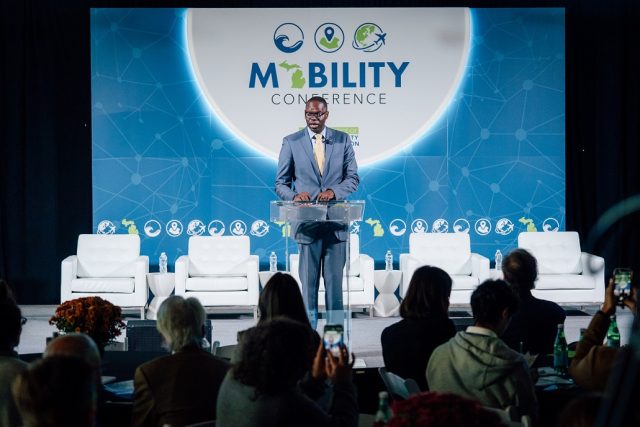[ad_1]
LANSING – Six organizations received $15 million in grants from the Michigan Office of Future Mobility and Electrification and Michigan Department of Transportation at the inaugural Mobility Conference in Detroit.
Launched in early 2024, the program sought grant proposals that addressed mobility gaps and improved access to education, jobs, health care, food, and social opportunities.
The six recipients of the $15M Equitable Mobility Challenge are Capital Area Transportation Authority, City of Ionia Dial-A-Ride, Feonix – Mobility Rising, Kalamazoo Metro Transit, Marlette Regional Hospital of the Aspire Rural Health System, and Mobility Development Operations.

Lt. Gov. Garlin Gilchrist II
“As we build the future of advanced manufacturing and future mobility, we must ensure every Michigander can access affordable and equitable ways to get around,” said Lt. Governor Garlin Gilchrist II. “The Equitable Mobility Challenge is investing $15 million in six winners who are growing Michigan’s economy and innovating new mobility solutions that improve quality of life for Michiganders across our state. Let’s keep standing tall for equitable mobility so every Michigander can build a great life.”
“On behalf of the Office of Future Mobility and Electrification, we are encouraged by the winning projects from the Equitable Mobility Challenge winners. Their contributions to enhancing Michigan’s mobility ecosystem demonstrate Michigan’s commitment to tackling mobility challenges and providing solutions for all Michiganders,” said Justine Johnson, Chief Mobility Officer for the State of Michigan.
“Congratulations to the first wave of $15M Equitable Mobility Challenge recipients for developing innovative transportation solutions and improving accessibility,” said State Transportation Director Bradley C. Wieferich. “This important funding program will help address mobility gaps and other barriers to underserved areas of the state, particularly for senior citizens, individuals with disabilities and veterans.”
$15 Million Equitable Mobility Challenge Winners
- Capital Area Transportation Authority (CATA): To improve accessibility and economic mobility in the Lansing area, CATA has proposed to Strengthen & Enhance Lansing Equity via Creative Transportation Solutions (SELECTS) by launching a new on-demand microtransit service for third-shift workers. Overnight microtransit service will make it easier for these underserved residents and those with disabilities to safely connect from an alternative schedule at their place of employment to their homes located throughout the greater Lansing region.
- City of Ionia Dial-A-Ride: To support public transportation, the City of Ionia has proposed launching a microtransit service across the entire county to provide reliable, easy-to-use, and accessible transportation. The service will use smart routing algorithms and draw on the experience of the local operators to optimize the service in a way that ensures access to transit for people across the county. This approach will mitigate the county’s mobility gap by supporting its operators in providing trips, raising its vehicle utilization, increasing the total service area, and improving/introducing access for residents.
- Feonix – Mobility Rising: Feonix will lead the establishment of a Transportation Assistance Hub network, in partnership with the United Way in southeast Michigan (Wayne, Washtenaw, Oakland, and Macomb counties). The Transportation Assistance Hub will create a technology framework to enhance connectivity and awareness of public transit services, as well as educational resources and a referral network of wrap-around supportive mobility management that is available to community members 24/7. The Transportation Assistance Hub model would build on the strong foundation of the Ride United program to significantly improve the breadth and depth of the barrier-busting supportive services component.
- Kalamazoo Metro Transit (Metro): Metro’s project proposal includes the expansion of microtransit service zones to provide better coverage in North Kalamazoo. Operationally, Metro will expand two planned, funded, soon-to-launch microtransit zones, one in the east and one in the west north ward. The service is designed to bridge the significant first- and last-mile gaps identified in the current public transit system and enhance access for disadvantaged populations to essential services such as job locations, grocery stores, healthcare, employment, and education. By providing a safe and reliable alternative to single-occupancy vehicle use, the microtransit service is a comprehensive approach to addressing the region’s mobility gaps, offering essential services to those in need while fostering a more connected, inclusive community.
- Marlette Regional Hospital: Marlette Regional Hospital has proposed a service to connect a variety of senior living facilities in Marlette with medical services and their community. The project, Effectively Connecting Seniors, will allow for senior facilities around Marlette Regional Hospital’s campus to have greater access to safe exploration of the Marlette community and travel to receive medical services more easily. With this project, they hope to address social isolation, mental and physical health, and community connections by focusing on senior citizens by utilizing golf carts for transportation to medical appointments and community events. By increasing access to healthcare and health-related events, it will help improve seniors’ physical well-being.
- Mobility Development Operations (MDO): This project will expand the recently launched MI Carshare platform statewide, with anchors in Grand Rapids and Detroit, leveraging momentum from MDO’s partnership with Forth and Michigan Clean Cities on the AMP project supported by the U.S. Department of Energy and as well as the City of Grand Rapids’ leading investment in MI Carshare which will carry into 2027. With support from the Equitable Mobility Challenge, MI Carshare can expand to a statewide footprint of 65 vehicles, covering the core service areas of many of the state’s transit agencies. The project’s statewide expansion will include densification of existing service in Grand Rapids and Detroit. This densification will leave the remaining cars flexible for expansion to cities that will be likely to see the most rapid uptake of this service, including Ann Arbor, Flint, Kalamazoo, and Lansing.
[ad_2]
Source link











